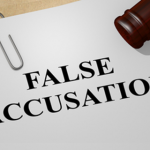What to Do if Falsely Accused of Sexual Assault?

High-profile cases such as the trial of Hey Dad! star Robert Hughes, the investigation of Hollywood movie mogul Harvey Weinstein and comedian Bill Cosby, and the prosecution of Australian entertainer Rolf Harris, along with the rise of the #metoo movement, and recent Royal Commission into child sexual abuse, have all shone a spotlight of sexual offences, encouraging complainants to come forward.
Overall this can be seen as a good thing – genuine victims should not be afraid to report serious crimes against. The result, according to the NSW Bureau of Crime Statistics and Research (BOCSAR), has been a rise in sexual assault complaints at a time when violent crime rates in our state are their lowest in forty years.
But what happens to those who are wrongly accused of sexual offences? And what should they do?
A case in point
In 2014, the mainstream media did a rare thing – rather than just ignoring false claims as usual, it actually reported that a Sydney man was wrongly imprisoned on sexual assault charges, his life irreparably damaged, for a crime he didn’t commit.
And although such media reports are rare, the innocent man’s plight is certainly not an isolated one.
While there are no official statistics on false sexual assault complaints, the fact of the matter is they certainly do occur. And while they take up valuable police time and community resources, and add pressure to an already overloaded court system, false allegations also ruin innocent lives.
In the case of Stephen Black, despite glaring inconsistencies and deficiencies in the prosecution case, the defendant was refused bail three times and kept behind bars for nearly a year before ultimately having the charges against him withdrawn.
He lost his job, his friends, his respectability in the community, his self-esteem – enduring an unimaginable time mentally, physically and financially.
Despite the obvious problems in the prosecution case, Mr Black was only released after his accuser made another false claim that she had been gang-raped by a car-load of men.
Investigations discredited the young woman’s allegations of gang rape beyond any doubt, just days before Mr Black was scheduled to go before a jury to have his long-term fate determined – 12 people on the electoral roll who don’t always get it right.
Mud sticks, and ruins lives
Some might think that biological family members, spouses and life-long friends would believe and stick by a person who was falsely accused, but that’s not always the case.
In the era of tabloid newspapers, radio shock jocks and of course social media, an individual’s reputation can be irreparably torn to shreds in the matter of minutes – sensationalist and ill-informed coverage and abusive tirades can lead to social alienation and life-long mental health issues.
They can cause a defendant’s ‘inner circle’ to question the association. The stress and anxiety of being falsely accused of a serious crime – especially a sexual offence and particularly an allegation against a child – can cause marital breakdowns, familial dissociation and incredible mental angst.
It can even lead innocent people to commit suicide and ‘end it all’.
Get legal assistance, and say nothing to police
If you’re accused of a serious offence that you did not commit, it is advisable to immediately consult a specialist criminal defence lawyer.
While everyone has the right to be assumed innocent until proven guilty, it’s not worth simply hoping that ‘justice will prevail’ – that your innocence will come to light, ‘eventually’.
It’s wise to recognise that the legal system is complicated and a specialised professional will be able to protect and assist you.
If you are contacted by police, you should not talk about the allegations against you. It is advisable not even to attempt to defend yourself by denying the allegations, as this may lead to further questioning which causes you to inadvertently say something which makes your defence more difficult.
Be aware that your discussions with police may be recorded (whether written down or otherwise) and used against you as evidence in court. Do not participate in a police interview. Say nothing to police – other than confirming your identity, producing identification if necessary.
Leave it to your lawyer
An experienced criminal defence lawyer will act as your voice, when you feel you don’t have one. They can be your protector when you feel disempowered. They are your adviser, even if you feel you have no-one left to turn to.
Your lawyer will liaise with police and/or the DPP on your behalf, ensuring the investigation is undertaken in accordance with the law, and that your rights are protected.
They will obtain relevant materials by subpoena, and carefully scrutinise prosecution ‘evidence’ once served. They will patiently take your instructions, make all necessary inquiries and investigations, formulate an effective strategy, brief relevant professionals, and build your defence.
In many cases, an experienced criminal defence lawyer will be able to persuade police not to bring criminal charges against you in the first place.
If proceedings are brought, and the prosecution case has problems, they will prepare detailed ‘representations’ (a formal document which is sent to the prosecution) calling for the withdrawal of the charges.
If the case nevertheless proceeds to a defended hearing or jury trial, they will fight for an acquittal.
Stay away from your accuser and prosecution witnesses
While the investigation is underway, it is important to avoid doing anything which may suggest interference with the course of ‘justice’.
This means you should stay away from your accuser and any prosecution witnesses. If this is not possible because you work or live with them, keep any communications to a minimum and certainly do not discuss the case – as this may lead to a separate investigation, for offences such as attempting to influence witnesses or pervert the course of justice.
Leave your case in the hands of a good lawyer, keep in regular communication with your lawyer, instruct them openly and honestly, and stay away from those involved in the prosecution case – and you will put yourself in a good position to be vindicated.
Charges were withdrawn or thrown out of court. What now?
If the case is dropped or thrown out of court due to problems in the complainant’s statements or testimony, you may wish to have your lawyer write to police and/or the DPP formally requesting that criminal charges are brought for false complaint and/or attempting to pervert the course of justice.
Although it is rare for prosecutorial bodies to charge sexual assault complainants, it has certainly occurred where the evidence of fabrication is strong – for instance, where a complainant claims to have been sexually assaulted at a particular location and time, but CCTV footage later emerges that proves this did not occur.
The request should detail the nature of the wrongful accusation, and include any supporting evidence such as statements and/or court transcripts, and material that is inconsistent with that ‘evidence’.
False complaints are a crime
Section 314 of the Crimes Act 1900 (NSW) makes it an offence punishable by up to seven years’ imprisonment for a person to make an accusation intending for another person to be the subject of an investigation of an offence, knowing that the other person is innocent.
If the complainant testified in court or swore a statement under oath, they may be prosecuted for the offence of perjury under section 327 of the Act, which carries a maximum penalty of 10 years’ imprisonment.
A person is guilty of perjury if it is proven they:
- Made a false statement under oath,
- It was made in, or in connection with, judicial proceedings,
- It concerned a matter which was material to those proceedings, and
- The maker knew the statement was false or did not believe it was true at the time it was made.
The maximum penalty for perjury increases to 14 years where the complainant committed the act with the intention to procure the conviction or acquittal of a person for a ‘serious indictable offence’ – which is one that carries a maximum penalty of at least five years in prison.
The complainant may also be charged with the offence of attempting to pervert the course of justice under section 319, the maximum penalty for which is also 14 years’ imprisonment.
Civil proceedings
An additional or alternative avenue of redress is civil proceedings for the damage caused as a result of the false complaint and/or prosecutorial misconduct, such as malicious prosecution or abuse of the court process.
Civil proceedings may be brought against the complainant and/or the State, in the latter case due to misconduct by the government’s prosecutorial agents.
False complaints ruin lives, especially when it comes to sexual offences. Those who make such complaints not cause innocent people to go through hell, they waste public resources, and can also make it more difficult for genuine victims to have their complaints believed and acted upon.






